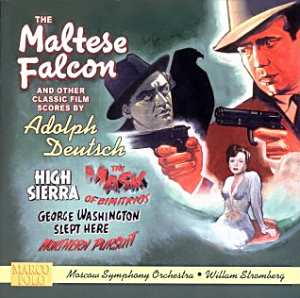Adolph DEUTSCH
The Maltese Falcon and Other Classic Film Scores (High Sierra, The Mask of Dimitrios, George Washington Slept Here, Northern Pursuit)
William Stromberg conducting the Moscow Symphony Orchestra
Marco Polo 8.255169 [75.11]

Five suites lasting just over 75 minutes give a rounded representation of Adolph Deutsch's work at Warner Brothers between 1941-44. Excellent introductory notes by Rudy Behlmer are headed Adolph Deutsch Rediscovered and make the case that the composer has been overlooked as a contributor to Warner's "golden age" of film music in favour of Steiner, Korngold and Waxman. Yet Behlmer provides his own explanation, quoting Lawrence Morton's description of Deutsch's Warner music as (in part) "thick textured, dissonant, sonorous, fragmentary in thematic material…" Indeed, what worked well on the screen has rather less appeal on disc than the rousing and richly melodic work of the aforementioned composers. Behlmer goes on to provide detailed notes on each of the five films together with brief comments on the music before John Morgan, who restored the scores, offers more specific commentary on each score.
By far the most famous film is The Maltese Falcon (1941), John Huston's directorial debut, the crime drama which foreshadowed film noir, and made Humphrey Bogart a major star. The score is presented over seven cues, plus the stock end title - a jaunty piece entirely out of keeping with the preceding drama. Like so many modern thriller scores the music is low key and atmospheric, with the composer deliberately avoiding "the Wagnarian approach" of multiple leitmotifs. The result is excellent film music but an unmemorable listening experience. It's much the same, though with darker, more intense writing, for the 1944 thriller The Mask of Dimitrios. As Behlmer says "Deutsch's score is almost entirely mood orientated - no leitmotifs for the various characters and locales, no melodies per se, but dark, mysterious, tension-filled orchestral sound colorings…" As the composer himself commented in the same year the score was composed (Film Music Notes, October 1944), such scores are "harder to write effectively, are barely noticed and rarely remembered…" No more lucid explanation could be offered for why Deutsch's music has remained largely absent from disc for so long. Expertly crafted as it is, it offers the listener little to latch onto and less to enjoy.
Offering a decided contrast is the shortest suite on the disc, 11 minutes from George Washington Slept Here (1942). This is old school comedy music filled with "Mickey-Mousing" and brief snippets of popular tunes such as "Yankee Doodle" designed to labour a comic point. It's a style scoring which seems terribly dated now, not to say hackneyed, corny and conceptually crude. Parodied mercelessly for decades, put bluntly this sort of scoring simply doesn't work anymore, and it sounds cringe-makingly embarrassing on disc.
Back to Bogart, this time on the wrong side of the law, and 1941's High Sierra - the most interesting music on the disc. Five cues offer more melodic but still tense and foreboding thriller music, but what is particularly notable is the melody central to "Velma's Plight", which surely all film music fans will recognise from Jerome Moross' The Big Country 17 years later! Moross it transpires, orchestrated Deutsch's scores from 1943 onwards…
The disc ends with the longest suite, 21 minutes and 10 cues from Northern Pursuit, a not-very-good Errol Flynn adventure from 1943. More action orientated than the straight thriller scores, the music is nevertheless in a similar mould, with taut suspense writing to the fore, punctuated by snarling bursts of intense confrontation. It's unlikely to hold the attention of any but the most hard bitten fan.
At the end of these 75 minutes one may be left thinking that Deutsch has been overlooked, but if so then not without good reason. The plain and for some uncomfortable fact is that not all "golden age" film music is good, and even some of that which is great does not in itself make for rewarding listening shorn from the silver screen. For those with an especial interest in the composer or for the films represented on this disc this is of course an excellent purchase. The playing is strong, dynamic and idiomatic and the recorded sound is good. Its just that even for dedicated fans of Steiner, Korngold and Waxman this disc may be hard work. Perhaps it is time for Morgan and Stromberg to give us something really worth preserving on CD, such as a complete recording of Miklós Rózsa's monumental Quo Vadis (1950). Or indeed, any Rózsa, as the composer has thus far been overlooked by their laudable Marco Polo series of classic film music recordings in favour of good but often no where near as distinguished work.
Gary S. Dalkin

Return to Index